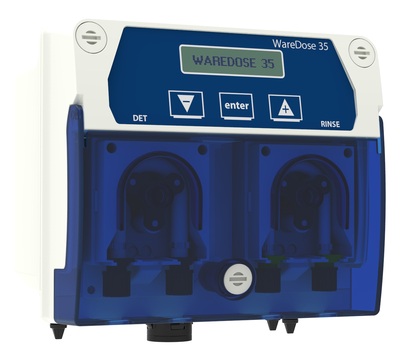Solving the hospital kitchen hygiene challenge

Among the challenges faced by kitchen managers in hospitals and other healthcare settings is maintaining exceptional hygiene standards while working within tight budget limitations.
Central to this — with the wellbeing of vulnerable patients to consider — is ensuring that on-site cleaning equipment is capable of achieving the highest level of performance and safety.
This begins with surface cleaning, where chemical dispensers used for dosing concentrated and pre-mixed solutions into sinks, spray bottles and mop buckets must combine precision and consistency with robustness and longevity.
In fast-paced kitchens where excessive force and accidental impacts are common, a robust dispenser casing helps to ensure consistent, reliable performance while reducing the cost of maintenance, repair and replacement.
For the handling of concentrated chemicals, integrated storage enables operators to save space and make cleaning stations tidier and more presentable. This also provides vital health and safety benefits by keeping detergents off the floor and avoiding possible spillage and trip hazards.
Such systems typically feature a cabinet-style enclosure where various-sized chemical containers can be stored and connected to the built-in dispenser. Lockable cabinets help to prevent theft and tampering and protect employees against exposure to harsh concentrated chemicals.
When it comes to a hospital kitchen’s dishwasher, without an appropriate automatic detergent dosing system the equipment can be a source of excessive consumption and wastage of chemicals, water and energy.
Therefore, to ensure that crockery and cutlery are washed to the same high standard every time, it’s advisable to install trusted automatic chemical dosing systems that achieve accurate, consistent chemical dosing over the long term.
As the Internet of Things continues to grow, many operators are turning to smart technology to enhance their dosing devices. The inclusion of IoT technology in such equipment can help operators track chemical consumption at their leisure via smartphone, helping them to identify wastage and adjust programming remotely for immediate efficiency improvements.
The incorrect disposal of fats, oils and grease (FOG) in hospital kitchens is a constant challenge for managers, with the build-up of these substances causing drains to block, back up and overflow. This presents a difficult hygiene and odour problem and, despite the best efforts of staff and management to alleviate the issue, the reality is that in such fast-paced environments it is inevitable that FOG will find their way into drains.
A popular solution to this problem comes in the form of drain dosing systems, which periodically dispense an enzyme solution directly into the drain line. This means fats are broken down before they can build up and cause wastewater pipes and drainage systems to block, overflow or release unpleasant smells.
No matter the equipment, the best chemical-handling systems are built using premium-grade components that offer superior compatibility with even the harshest concentrated solutions.
This means parts are more resistant to degradation from harsh concentrated detergents, helping to deliver repeatable results and extensive equipment lifespan while reducing maintenance requirement.
When it comes to maintaining exceptional cleaning and hygiene standards, it’s clear that a little investment can go a long way. Chemical systems expert SEKO knows this better than most as the company has been helping operators for decades with a dedicated range of dilution, dispensing and dosing equipment.

These include the modular ProMax dilution unit, which dispenses premixed cleaning products into spray bottles, mop buckets and scrubber-dryers, and compatible systems such as the SekureMax chemical storage cabinet. There’s also the IoT-enabled WareDose family of products for use with commercial dishwashers, while SEKO’s DrainDose unit offers a cost-effective, fit-and-forget solution to blocked drains lines.
Visit www.seko.com to explore the complete range.
The Emergency Department Access & Performance Conference
The Emergency Department Access & Performance Conference arrives at a critical juncture as...
Enhancing Patient Care Through Smart Design at Paula Fox Melanoma & Cancer Centre
GENTEC worked closely with the contractors to supply solutions for clinical areas where hygiene...
Revolutionising healthcare on-premise laundry
Alongside peristaltic, solenoid and pneumatic pump-driven equipment, SEKO has revolutionised...



![[New Zealand] Transform from Security Awareness to a Security Culture: A Vital Shift for SMB Healthcare — Webinar](https://d1v1e13ebw3o15.cloudfront.net/data/89856/wfmedia_thumb/..jpg)
![[Australia] Transform from Security Awareness to a Security Culture: A Vital Shift for SMB Healthcare — Webinar](https://d1v1e13ebw3o15.cloudfront.net/data/89855/wfmedia_thumb/..jpg)




